by [email protected] | Mar 30, 2022 | Prescriptions for your Practice
Podcast: Play in new window | Download
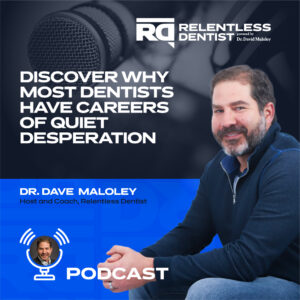 “Remember to be careful when following the masses; sometimes the “M” is silent.” — Anonymous
“Remember to be careful when following the masses; sometimes the “M” is silent.” — Anonymous
Today’s problem that we’re discussing is that we live in a society looking for bandaid solutions, quick fixes, and magic pills. These things lead to a lack of accountability, leading to a lack of results — which I call the commodity trap. I don’t want you to be in a situation chasing down the masses and living to someone else’s vision and version of success and live the rest of your life in quiet desperation. Step into the possibility that we can all choose a mastery path.
In this episode, I discuss why the masses are asses. So if you want to:
- elevate your practice owner confidence,
- avoid the pain of being a dabbler, obsessive, and hacker,
- be the most sought-after dentist in town,
- know how to prioritize your skill stack for fun and profit,
Listen now! This episode is for you.
Tune in and find solutions to common practice issues at Prescriptions for Your Practice.
Key Quotes:
- “Lots of dentists are worried about the commoditization of dentistry, but those same dentists likely aren’t de-commoditizing themselves and working on elevating their confidence.”
- “The first move to mastery is not outward but inward — Robert Green”
- “You feel called to do certain things, or you have unique skills or unique strengths that aren’t common. They might be easy for you and really hard for somebody else. And you might get frustrated at somebody else.”
- “What we’re looking for in a dental practice is complementary strengths, complementary life’s tasks that help us synergize.”
- “The path to mastery is a windy road. Our vocation is a windy road. It is not a straight line. And so, we have to engage on this journey.”
- “Leadership and marketing are the ways that you multiply yourself.”
- “If you want fulfillment, and you want more money, and you want a better lifestyle, then the operative word is grow.”
Featured on the Show:


by [email protected] | Mar 23, 2022 | Prescriptions for your Practice
Podcast: Play in new window | Download
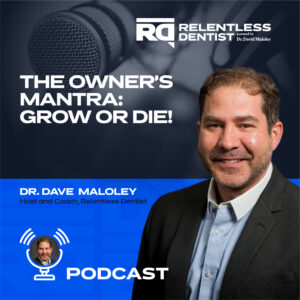 I might hear you say, “That’s quite a statement, Dr. Dave.” Well, let’s put it subtly. If you’ve been religiously listening to my podcast, you’ve been hearing me say this countless times that it’s become my business mantra: “Practice isn’t limited by its opportunity; It’s limited by its leader.”
I might hear you say, “That’s quite a statement, Dr. Dave.” Well, let’s put it subtly. If you’ve been religiously listening to my podcast, you’ve been hearing me say this countless times that it’s become my business mantra: “Practice isn’t limited by its opportunity; It’s limited by its leader.”
Let’s talk about the potential, the possibility that every practice owner can embrace a CEO’s mission held in one word — GROWTH. So let’s get into that whole growth idea and what it means to you as a practice owner at the beginning and end of every quarter because I think you should sit down at the end of every quarter and give yourself an hour — this is CEO time to ensure that you’re enjoying more and more cash flow.
Since we’re about to usher in Q2, we have a heavily-packed episode today in line with our week-four theme, enjoying cash flow. Today’s podcast will discuss the six questions you need to ask yourself every quarter. We’ll look into the five machines that create the macro system in your business. And lastly, we’ll dig deeper into three different angles to distill down your growth. So that’s a lot to chew on as you grow or die in Q2 of 2022. Let’s get started!
Tune in and find solutions to common practice issues at Prescriptions for Your Practice.
Key Quotes:
- “Status quo is a dangerous delusion.”
- “I don’t think a status quo is real. I think you’re either getting better or getting worse as a human, as a business owner, and as a business.”
- “Your mission is to grow on multiple levels.”
- “The concept of expansion is the natural desire of all mankind.”
- “If you’re trapped in “we are a dental practice,” you are more likely to be commoditized.”
- “When we’re planning for growth, we have to take into account that there will be obstacles and there will be challenges.”
- “The identity shift here is that this is not a dental office; this is a training and development company. If you run a training and development company, everyone is always getting better at their jobs.”
Featured on the Show:
- People: Sadhguru, yoga guru, and proponent of spirituality.
- People: Earl Nightingale, author.
- People: Denis Waitley, author, keynote lecturer, and productivity consultant.
- People: Travis Kalanick, co-founder and former CEO of Uber.
- People: Travis Bradberry, author, and co-founder of TalentSmart.
- People: Ed Mylett, podcaster, author, and keynote speaker.
- I appreciate your feedback. Let me know what you learned and loved here: [email protected].


by [email protected] | Mar 16, 2022 | Prescriptions for your Practice
Podcast: Play in new window | Download
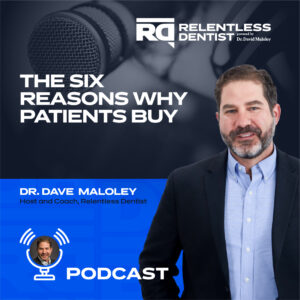 Approach each customer with the idea of helping him or her solve a problem or achieving a goal, not selling a product or service. — Brian Tracy
Approach each customer with the idea of helping him or her solve a problem or achieving a goal, not selling a product or service. — Brian Tracy
I want to hear your honest answer to this question: When a patient walks into your dental office, do you see them as a patient or a customer? There’s no right or wrong answer here, actually. I just want you to be conscious of how your patients perceive you. Are you coming in as a doctor providing a solution or a business person selling them products?
In today’s episode, our topic is about enthusing clients. We’ll talk about how you can humanize yourself so that your patients understand that you’re just not a lady or a gentleman in a white coat. We will have a thoughtful discussion on the six emotional cues on why patients buy — or don’t. I will also share insights on how you and your team can authentically connect with your patients and sell them a solution, not the product. So relax, press that play button, and get ready to enthuse more clients!
Tune in and find solutions to common practice issues at Prescriptions for Your Practice.
Key Quotes:
- “When we’re talking to our patients, we shouldn’t talk to their brain. We should talk to their heart.”
- “When discussing treatment with patients, our objectives should be to minimize the downside or pain and maximize the upside or pleasure.”
- “We’re talking about selling the consequences and helping them understand whatever the truth is because they will move forward for their reasons, not your reasons.”
- “All business is human to human.”
Featured on the Show:


by [email protected] | Mar 9, 2022 | Prescriptions for your Practice
Podcast: Play in new window | Download
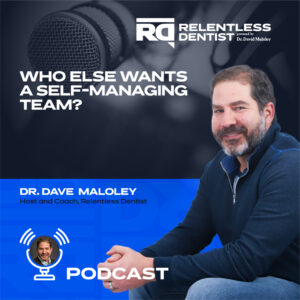 How close are you to having a self-managing team? Do you think it’s realistic or too utopian?
How close are you to having a self-managing team? Do you think it’s realistic or too utopian?
Before we dig into our topic, let’s look at these three powerful statistics that will help gauge your team and where you are in terms of having a self-reliant culture and robust practice.
- 60% of employees believe that their coworkers are the biggest contributor to their happiness at work.
- 63% of employees have wanted to quit a job because they feel like poor communication gets in the way of their jobs.
- 67% of employees would go above and beyond if they felt valued and engaged.
If you’re losing more than half of your staff regularly and think things are getting out of hand, you may want to look into the above realities.
This week’s topic is enhancing culture, notably establishing a self-managing team. So the problem that we’re going to be addressing today is this outdated industrial age carrot and stick management and determining the appropriate management style that best suits your team. Why? Because if you want a healthy, stable growth trajectory over the next five, ten years in your practice, making it a priority to build a self-managing team is good for you, your paycheck, your patients, and your team.
Tune in and find solutions to common practice issues at Prescriptions for Your Practice.
Key Quotes:
- “If they’re [staff] constantly feeling like they should be rewarded or punished for getting in trouble, they’re not going to be even close to their potential — they’ll tend to hide their mistakes, they’ll tend to kind of pad their stats and cut corners.”
- “One of the biggest myths in dentistry is — I’m not a good leader because I’m not charismatic. In reality, as long as your heart is in it and you’re really behind the words that you’re saying, you’re very intent to know about where the practice is headed; charisma can be a net negative depending on the situation.”
- “Happy work means productive work. Yet we tend not to spend a lot of time and energy ensuring that our teams are fully engaged and unified.”
- “There are about as many different leadership styles as there are leaders.”
- “There are some team members that if they’ve been with you a long time, they’ve become internal leaders, and you don’t really have to do a lot in terms of management because they’re forced multipliers, and they make other team members better.”
- “You can be rigid on the outcome, but you should be pretty agnostic on the path.”
Featured on the Show:


by [email protected] | Mar 2, 2022 | Prescriptions for your Practice
Podcast: Play in new window | Download
 What do Lady Gaga, Tom Hanks, Howard Shultz (Starbucks), you and I have in common? Well, we “suffered” from imposter syndrome at some point in our lives — and probably will still do as we progress with our lives. What exactly is Imposter Syndrome? It depends on who you ask.
What do Lady Gaga, Tom Hanks, Howard Shultz (Starbucks), you and I have in common? Well, we “suffered” from imposter syndrome at some point in our lives — and probably will still do as we progress with our lives. What exactly is Imposter Syndrome? It depends on who you ask.
It starts with the “What’s in it for…” question most of the time. What’s in it for me, my family, my business, my patients, my legacy, my bank account? Then comes self-doubt. But how do these famous, influential people turn the odds in their favor and succeed? That’s what you’re going to find out in this podcast.
This week’s episode is about elevating your confidence. I’ll talk about imposter syndrome as defined in different schools of thought and demystify this phenomenon. I will also share tips on how to conquer this with a simple trick. So grab a seat, listen in, and take charge!
Tune in and find solutions to common practice issues at Prescriptions for Your Practice.
Key Quotes:
- “High achievers people going for things like you and I, people with advanced degrees, people who go into entrepreneurship often get plagued by questions like — ‘Why should anyone listen to me?’, ‘Don’t they know more than I do?’, ‘Am I good enough to be here?’ or ‘Do I belong here?'”
- “We can reframe this fraudulent feeling, often called imposter syndrome, and embrace it so that it’s no big deal. And it actually starts to identify or be the possibility of a sign that you’re in the exact right place.”
- “Growth mindset essentially means that it’s not a talent or not a talent. It’s a skill that can be developed.”
- “The more leverage you get on yourself, the more likely you are to see that this thing that’s often called resistance is no big deal, and it’s common.”
Featured on the Show:


by [email protected] | Feb 23, 2022 | Prescriptions for your Practice
Podcast: Play in new window | Download
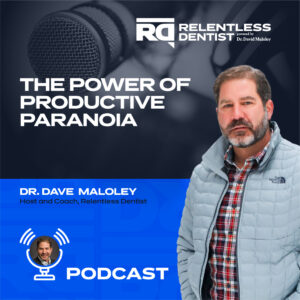 According to Andy Grove, Productive Paranoia is the ability to be hyper-vigilant about potentially destructive events that can hit your company and then shift that fear into preparation and clearheaded action.
According to Andy Grove, Productive Paranoia is the ability to be hyper-vigilant about potentially destructive events that can hit your company and then shift that fear into preparation and clearheaded action.
How much time do you spend on offense when facing challenges in your practice? Based on my experience, 90% is the magical number, enough to grow the practice, team, and patient demand. What about the remaining 10%?
In today’s episode, I’ll talk about that 10% defensive mechanism and the steps into productive paranoia that will help you create something that’s not susceptible to market and economic shifts. I will discuss some essentials to ensure that you’re a good steward of that cash flow and that you’re preventing a downside. As you listen in and enjoy the podcast, I hope you put it into action, implement some ideas from today, take notes and get a little more prepared through productive paranoia.
Tune in and find solutions to common practice issues at Prescriptions for Your Practice.
Key Quotes:
- “You, the doctor owner, are the number one asset in the practice.”
- “Busyness does not equate to business, and it needs to get rid of the undisciplined motion and the wasted time motion in the practice each day.”
- “A productively paranoid practice sees the power and series of thoughtful “What if…” questions. And working through these dangers, you can create effective actions and clearheaded preparation that ensures that your practice flourishes no matter what happens.”
- “Make sure that you maintain your calculated aggressive optimism forward-moving; stepping into your vision-type posture is really important, but not to the point of being naive.”
- “Nothing fails like success.”
Featured on the Show:


by [email protected] | Feb 16, 2022 | Prescriptions for your Practice
Podcast: Play in new window | Download
 How do you level up your marketing strategies, especially in this digital age? You might be dancing on TikTok or pointing at things on IG reels. And I think that’s great, but word of mouth is still a compelling way to generate enthusiasm — mainly Evangelism Marketing.
How do you level up your marketing strategies, especially in this digital age? You might be dancing on TikTok or pointing at things on IG reels. And I think that’s great, but word of mouth is still a compelling way to generate enthusiasm — mainly Evangelism Marketing.
Evangelism Marketing is an advanced form of word-of-mouth marketing. It’s a cost-effective way that keeps your clients loyal, your brand trustworthy, and your culture robust. Very far from blabbering and spewing nonsensical dental jargon that results in practically nothing.
Today’s podcast is about enthusing your clients. We’re going to be addressing the problem that many practices have become overly reliant on digital platforms. We’re going to infuse some enthusiasm into your routine. We’re going to create a surge of surprise and delight, and I’m going to throw out what I call the Evangelist challenge. Are you curious now? Stay tuned and find out.
Tune in and find solutions to common practice issues at Prescriptions for Your Practice.
Key Quotes:
- “Individuals, patients, in this case, want to make the world a better place. And evangelist customers or clients or patients spread their recommendations and recruit new customers for you, just out of belief in you and what you can do.”
- “If your administrators are maniacs about capturing where patients heard about you from, make sure that they are so good at that.”
- “If you have a practice of 2000, 1% is your super clients — this is your evangelist.”
- “There’s an unlimited opportunity on a practice to do this sort of thing, to pour into your patients, to make remarkable experiences and be extraordinarily extraordinary.”
Featured on the Show:


by [email protected] | Feb 9, 2022 | Prescriptions for your Practice
Podcast: Play in new window | Download
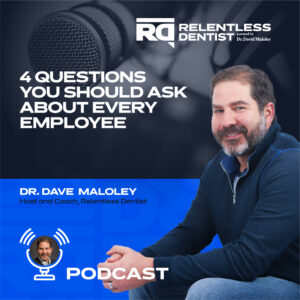 Fact: In today’s polarized and litigious society, it’s easier to complain than find good employees. Crafting a reliable team to work with is almost next to impossible. But there’s still hope.
Fact: In today’s polarized and litigious society, it’s easier to complain than find good employees. Crafting a reliable team to work with is almost next to impossible. But there’s still hope.
How do you build a practice with a culture that gives patients an experience in a high trust environment? That gives employees a workplace that provides them both money and meaning? And that ensures the vitality of your business? If you’re asking yourself these questions, you have to listen in.
This week’s podcast topic is about enhancing culture — I’ll be discussing four questions you should ask yourself about every single employee. I’ll cover the most valuable skill a dental practice owner can develop far more valuable than any procedure you can learn or add to your procedure mix. So, if you want a framework that unleashes the genius of your team, a way to diagnose the dysfunctions in your culture, and a method to avoid all that counterproductive advice that inhibits team immunity and holds your practice back, then stay tuned.
Tune in and find solutions to common practice issues at Prescriptions for Your Practice.
Key Quotes:
- “I’m proposing is that we become great at diagnosing the true problem and master the art of building and aligning a team.”
- “Team building is the most valuable skill to acquire in our profession right now.”
- “One of the keys to strong leadership is you teach people how to think. You teach them how you would make decisions, and therefore they can make decisions.”
- “If we start to engage these things, you’ll see people get a little bit better and a little bit more confident, a little bit more decisive, a little bit more service-oriented, and surprise and delight patients a little bit more.”
- “And a lot of people say, I can’t get my team to think like an owner, and that’s a partial truth. They’ll never be as invested as you are.”
Featured on the Show:


by [email protected] | Feb 2, 2022 | Prescriptions for your Practice
Podcast: Play in new window | Download
 I’d rather be dumb and antifragile than extremely smart and fragile, any time. — Nassim Nicholas Taleb
I’d rather be dumb and antifragile than extremely smart and fragile, any time. — Nassim Nicholas Taleb
In this time of uncertainty, where do you find an anchor where you can draw strength to take on the challenges in your dental practice and push outside your comfort zone? We no longer live in a world of a predictable future. We need to become antifragile to become stronger as we face adversity.
This episode will talk about several ideas, tactics, and practices to help you become more antifragile and how you can fall in love with volatility. I will also share some examples of famous people taking on antifragile identity. Have you heard about Eleanor Effect? Listen in and learn how this can help you improve your day-to-day life.
Tune in and find solutions to common practice issues at Prescriptions for Your Practice.
Key Quotes:
- “They [comedians] were talking about how challenging writing sketch and standup comedy is today because people are so thin-skinned, and you can’t do any political humor without getting half the people off.”
- “If you can truly become antifragile, it’s an unfair advantage in the next five to 10 years for you as a practice owner.”
- “It’s a bad time to be a fragile practice owner, and even a robust practice owner will have challenges with the uncertainty and the volatility that’s been here for the last couple of years.”
- “An antifragile leader will create a higher level of confidence for himself and be the role model for an antifragile culture.”
- “We’re paid based on our ability to receive threats and turn them into solutions.”
- “It’s really beneficial to be very intentional about doing one thing that scares you every day.”
- “The future will get more and more unpredictable as we go on. So it doesn’t really benefit us to try and predict the future, but it does benefit us to be prepared for the future.”
Featured on the Show:


by [email protected] | Jan 26, 2022 | Prescriptions for your Practice
Podcast: Play in new window | Download
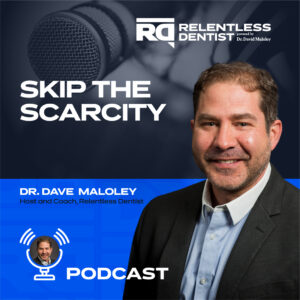 Scarcity in abundance. These terms get a little overused, like gratitude, blessed, abundant. We can feel these things, or we can use these things as tools. And the problem that I see here is that we’re living in a vortex of scarcity. We quickly get lost in the labyrinth of overabundant resources that we fail to focus on and address issues that will keep our culture and practice sustainable.
Scarcity in abundance. These terms get a little overused, like gratitude, blessed, abundant. We can feel these things, or we can use these things as tools. And the problem that I see here is that we’re living in a vortex of scarcity. We quickly get lost in the labyrinth of overabundant resources that we fail to focus on and address issues that will keep our culture and practice sustainable.
This week’s topic is enjoying cash flow. Today’s episode talks about how you can use abundance as a tool or develop tools that lead you to abundant thinking that make sure that you are taking suitable risks and making the right choices for today, tomorrow, and the future. So listen, take charge, and lead the way!
Tune in and find solutions to common practice issues at Prescriptions for Your Practice.
Key Quotes:
- “Social media is really designed to create insecurity.”
- “We very intentionally engineer our days to keep us focused on what’s good and what’s possible. Thinking abundantly helps you enjoy cash flow because you’re seeing the opportunities, and you’re taking the calculated risks that keep a practice growing and evolving right.”
- “If you’re going to transform a business or a person, it all starts by transforming a story.”
- “We have to realize that our brain is not designed for wealth. It’s not designed for prosperity. It’s not designed for great days. It’s designed to keep you safe and alive.”
- “Optimism needs to be had with a healthy dash of skepticism.”
- “If you don’t show up with real hope and real abundance, forget about it. Your team is not going to either.”
- “Since I was a little kid, they would say, You are what you eat. Now a lot of our diet comes in from our eyes and our ears because of media.”
- “An investment in your team and your patient experience is the most profitable and predictable investment out there.”
Featured on the Show:


 “Remember to be careful when following the masses; sometimes the “M” is silent.” — Anonymous
“Remember to be careful when following the masses; sometimes the “M” is silent.” — Anonymous


 I might hear you say, “That’s quite a statement, Dr. Dave.” Well, let’s put it subtly. If you’ve been religiously listening to my podcast, you’ve been hearing me say this countless times that it’s become my business mantra: “Practice isn’t limited by its opportunity; It’s limited by its leader.”
I might hear you say, “That’s quite a statement, Dr. Dave.” Well, let’s put it subtly. If you’ve been religiously listening to my podcast, you’ve been hearing me say this countless times that it’s become my business mantra: “Practice isn’t limited by its opportunity; It’s limited by its leader.”

 What do Lady Gaga, Tom Hanks, Howard Shultz (Starbucks), you and I have in common? Well, we “suffered” from imposter syndrome at some point in our lives — and probably will still do as we progress with our lives. What exactly is Imposter Syndrome? It depends on who you ask.
What do Lady Gaga, Tom Hanks, Howard Shultz (Starbucks), you and I have in common? Well, we “suffered” from imposter syndrome at some point in our lives — and probably will still do as we progress with our lives. What exactly is Imposter Syndrome? It depends on who you ask. According to Andy Grove, Productive Paranoia is the ability to be hyper-vigilant about potentially destructive events that can hit your company and then shift that fear into preparation and clearheaded action.
According to Andy Grove, Productive Paranoia is the ability to be hyper-vigilant about potentially destructive events that can hit your company and then shift that fear into preparation and clearheaded action. How do you level up your marketing strategies, especially in this digital age? You might be dancing on TikTok or pointing at things on IG reels. And I think that’s great, but word of mouth is still a compelling way to generate enthusiasm — mainly Evangelism Marketing.
How do you level up your marketing strategies, especially in this digital age? You might be dancing on TikTok or pointing at things on IG reels. And I think that’s great, but word of mouth is still a compelling way to generate enthusiasm — mainly Evangelism Marketing.
 I’d rather be dumb and antifragile than extremely smart and fragile, any time. — Nassim Nicholas Taleb
I’d rather be dumb and antifragile than extremely smart and fragile, any time. — Nassim Nicholas Taleb Scarcity in abundance. These terms get a little overused, like gratitude, blessed, abundant. We can feel these things, or we can use these things as tools. And the problem that I see here is that we’re living in a vortex of scarcity. We quickly get lost in the labyrinth of overabundant resources that we fail to focus on and address issues that will keep our culture and practice sustainable.
Scarcity in abundance. These terms get a little overused, like gratitude, blessed, abundant. We can feel these things, or we can use these things as tools. And the problem that I see here is that we’re living in a vortex of scarcity. We quickly get lost in the labyrinth of overabundant resources that we fail to focus on and address issues that will keep our culture and practice sustainable.